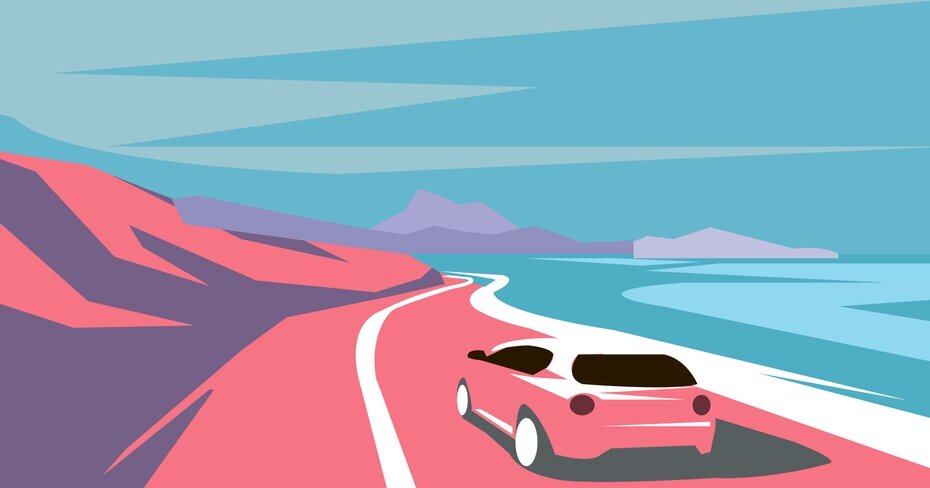How to save money on your next road trip
By: Barry Choi on June 6, 2023
With temperatures rising, you may be tempted to leave the congested city for greener pastures and wider landscapes. It’s summer! And with summer come beach vacations, cottage trips, and camping weekends. You know what that means: It’s time to load up the car.
Taking a road trip can be a fun experience for all types of travelers, allowing Canadians to explore beyond their own backyard. However, if you’re not careful, it can quickly grow into more than you budgeted for.
Here are six ways to save money while maximizing the memories on your next family road trip.
Choose the right ride
The vehicle you choose can make a significant difference to your bottom line. If you’re travelling within Canada, there’s a good chance you’ll be able to use your own car, which will save you money on car rental fees.
However, on some road trips, sometimes a rental car is necessary, so you want to choose the right one. Rental car agencies will typically categorize their vehicles by size. Generally, the bigger the car, the more expensive the daily rate will be.
Another thing to consider is if the vehicle you’re choosing is good on gas. Some rental companies let you rent electric vehicles (EVs). You’ll likely be paying more for an EV, but you’ll save on gas by not having to fill up every 500 kilometres — just make sure you’ll be near a charging station when you need it.
Don’t get extra auto insurance when you don’t need it
Speaking of rental cars, agencies will usually prompt you every time about getting auto insurance. It’s tempting to say yes — after all, there’s no price for peace of mind, right? But before checking the opt-in box, make sure you’re not already covered for car rental insurance through your credit card or car insurance.
If you own a car and currently have an auto insurance policy, there’s a very high chance that you’re covered for car rentals. These policies usually include third-party liability insurance, so there’s no need to purchase additional insurance for rentals.
Many credit cards also offer rental car insurance as a standard benefit. The catch is that you’ll usually need to pay for the entire rental with your credit card for the insurance to be valid. Credit card rental car insurance will rarely cover third-party liability insurance, but that shouldn’t be a huge concern. In most countries, it’s required by law that car rental agencies have some third-party liability insurance included. The insurance being offered is just additional coverage.
Before you rent a car, you should scan your own insurance policy to see if your rental is already covered. You should also check out what the local laws are regarding third-party liability insurance. With this knowledge, you can make an informed decision about your actual auto insurance needs.
Pack your meals
Since you’ll be on the road for quite some time, you may want to consider packing a full-sized cooler so you can store food and drinks. Do a bit of grocery shopping and prep before you leave so that you have food for a few days — this is also an opportunity to stock up on fruit and vegetables, because gas stations aren’t exactly known for healthy options.
Be sure to pack enough drinks and snacks too. Ice can be easily purchased at gas stations, so you won’t need to worry about keeping things cold.
Make-ahead meals will always be cheaper than buying food, but that doesn’t mean you shouldn’t visit any local restaurants. Planning to eat out one meal a day or snack at a few different places will allow you to sample the local food scene without blowing your budget.
Don’t stay in the popular areas
Admittedly, the best place to stay when travelling is often right in the heart of the action, but that’s usually where the most expensive hotels are. Since you’ll have access to a vehicle, you might as well avoid the high-demand areas and consider the suburbs instead. Once you get outside of the core, hotel prices can drop significantly. Look for somewhere that has a low nightly rate, free parking, and access to public transportation. If you’re lucky, they may even offer free breakfast.
Cash in some of your credit card points
As people slowly start embracing post-pandemic travel again, many are sitting on a massive bank of points that they’ve earned with their credit cards. Instead of hanging on to them for flights, why not use them for your rental car and/or hotels during your road trip?
Just about every travel rewards program has some kind of partnership with a car rental agency if you book through their member portal. That lets you use your points to offset costs. Suppose your loyalty program has hotel partners or allows you to redeem your points on any type of travel expense. In that case, it’s worth cashing in so your accommodations will cost you less.
It’s the same with gas. Gas stations like Esso, Petro-Canada, Chevron and Ultramar have deals and partnerships with certain credit cards. Before setting off, see if any of your cards offer cashback or discounts on gas so you can save while you spend.
Use technology to your advantage
Some of the best ways to save money on your road trip can be found on your smartphone. You should always be using your GPS so you won’t get lost and waste gas. If you were an adult before the age of smartphones, you may remember wasting hours — and up to a tank’s worth of gas — on the road trying to figure your way around a paper mask. Now, you have GPS at your fingertips: Make sure you use it.
And when you need to fill up, the app GasBuddy displays the cost of gas at nearby gas stations so you can plan accordingly.
The beauty of road trips is that there are limitless options on the open road: You can choose where you dine, where you sleep, and where you go. And with each of those options is the opportunity to scoop up savings without compromising on the enjoyment of your adventure. And before you hit the road, make sure you compare travel insurance options so that you can save money while still getting the peace of mind that you need.
Keep reading: Unusual driving laws in Canada

.jpg?itok=88nBkwga)
.jpg?itok=W5fSKczJ)